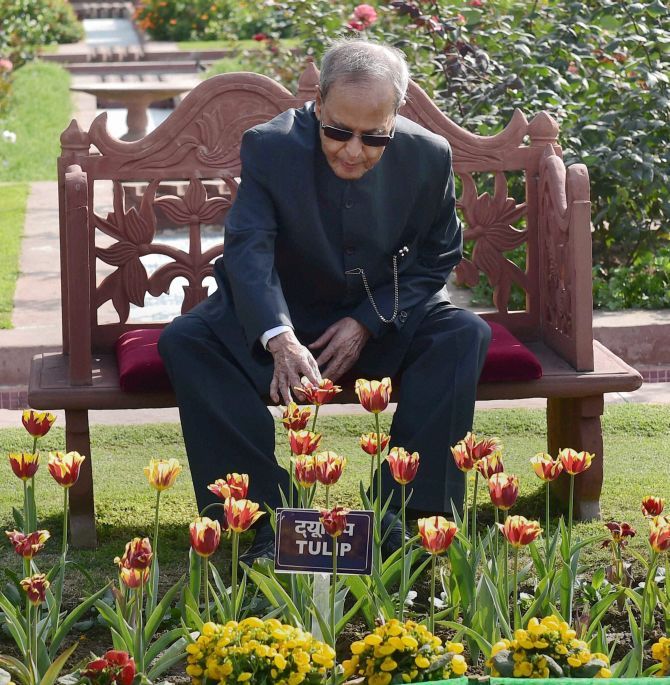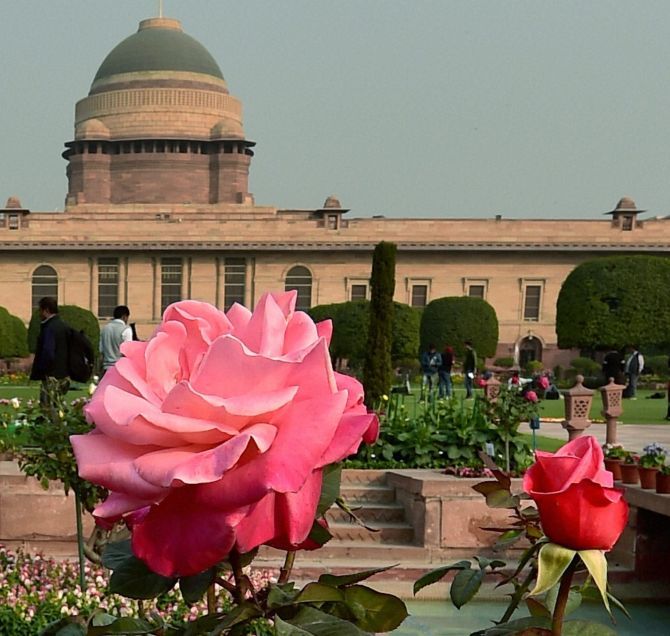The regal Mughal Gardens at the Rashtrapati Bhavan will be thrown open to the public on Friday.
Before the gates to the garden open, Rediff.com brings you a sneak peek at the garden, which is in full bloom.

The world famous Mughal Gardens in Rashtrapati Bhavan will be open for public from Friday.
President Pranab Mukherjee on Thursday inaugurated the annual Udyanotsav, which marks the annual opening of Mughal Gardens to the public.
The Mughal Gardens will remain open for general public from February 12 to March 19, (except on Mondays which are maintenance days) between 9.30 am to 4 pm.
Members of the public will also be able to visit the Spiritual Garden, Herbal Garden, Bonsai Garden and Musical Garden, a press release issued by Rashtrapati Bhavan said.

Entry and exit for the general public will be from Gate no 35 of the President's Estate, close to where North Avenue meets Rashtrapati Bhavan.

Visitors are requested not to bring any water bottles, briefcases, handbags, ladies purses, cameras, radios, transistors, boxes, umbrellas, eatables etc. Such articles, if any, will have to be deposited at the entry point.

The Mughal Gardens will be open exclusively on March 20 to special category of visitors viz farmers, differently abled persons, defence and para-military forces and Delhi Police personnel from 9.30 am to 4 pm. This entry and exit will also be through Gate no 35, it said.

The Tactile Garden will be open for visually impaired people on March 20 from 11 am to 4 pm. Entry and exit will be from Gate no 12, situated on Church Road (next to the North Avenue).
About 4.68 lakh people had visited MughalGardens last year.

The highlights for visitors this year would be tulips, roses and primroses, said U D Kukreti, officer on special duty (horticulture).
“Another interesting plant is the flower called ‘Lady’s Purse’, which resembles women’s handbags,” Kukreti said.

President Pranab Mukherjee, who enjoys his morning walk in the MughalGardens, will officially declare the festival open on Thursday.

The gardens, which are three successive terraces, have been inspired by the Mughal gardens of Jammu and Kashmir. With water channels running along the lawns, birds and butterflies flock to the flowerbeds that have dahlias, carnations, roses and pansies. This time, the horticulture staff has planted 12,000 tulips that were especially flown in from Holland.
“The blooming tulips show the hard work of our gardeners. The tulips are sent from Holland in a temperature-controlled environment. Our vans from the Rashtrapati Bhavan pick them up from the airport and the temperature is maintained in refrigeration units,” Kukreti said.
The tulips, which were planted in December and began to bloom in January, are likely to wither away by February 25, according to horticulture department officials.

Apart from the MughalGardens, visitors will also be able to take a peek at a herbal garden that has 33 medicinal and aromatic plants, a bonsai garden with about 250 plants, a cactus garden with 80 varieties and a musical garden with 12 fountains.










